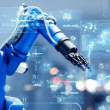The future of software development will be more than just cloud-native applications.
It will be a world that embraces DevSecOps and AI, where IT operations and developers specialize in specific areas, and software teams constantly push new code in production.
Here’s A Look At software development In 2023
1. DevSecOps Will Take On Greater Importance

DevSecOps is a movement to bring security and operations together. It is about building security into the development process, automating security testing, and integrating it into the build and delivery pipeline.
The key to DevSecOps success is the right SCA tools to make it easy for everyone on your team—not just developers—to deploy secure applications quickly without worrying about configuration management or other tedious tasks.
DevSecOps also helps foster communication between developers and IT staff, enabling them to work as a more cohesive unit as they deploy new applications that meet compliance requirements faster than ever.
This is why DevSecOps is becoming increasingly important as more businesses adopt a DevOps model. And, if you want to stay competitive in today’s marketplace, you need to keep up with the latest trends and technologies to help your company succeed.
2. AI will become part of the stack
Until a few years ago, AI was only available to large corporations and tech giants. But today, you can get started with AI in just a few minutes by using the right tools.
This democratization of AI has opened it up to businesses of all sizes, which means that the technology is quickly becoming part of the standard stack for many companies.
AI will likely become a part of the software development stack as it is used for improving user experience, quality, security, and DevOps.
There are multiple reasons for this:
- AI can improve user experience by making applications easier to use by understanding users’ needs better than humans.
- AI can also help improve quality by automatically testing software and finding bugs before they are released to users. This helps developers find and fix issues early in the cycle, improving the quality of the product or service delivered to customers.
- AI can be used to enhance security efforts through automated threat detection systems that prevent cyber attacks from affecting end users or sensitive information stored on their devices or in cloud services.
This change is already visible in many industries. For example, many companies are using AI to improve the customer experience by personalizing it and making it feel more human.
This can be done through chatbots that help customers find information, place orders, or create a personalized shopping experience based on previous purchases and other data points.
3. IT operations and development will specialize

As software becomes more complex, it will continue to need the development talent of today. But you can expect these developers to be more specialized and focused on specific areas of the stack.
I’m excited about seeing operations become even more specialized than they already are today—so much so that there will be people who work solely on operations-related tasks.
The idea of having someone whose entire job is monitoring your servers and ensuring everything runs smoothly sounds fantastic to me right now!
The role of DevOps professionals may also change since there will be less need for someone with a lot of technical knowledge if each person on the team is an expert in their area (e.g., UI/UX).
4. Cloud platforms, containers, and microservices will continue to rise
The rise of cloud and container technologies has been a boon for developers, allowing them to focus more on their applications and less on operations.
With microservices architecture becoming the standard, developers will continue to benefit from these advancements as they become more mature.
So what can we expect in 2023?
We’ll see more tools that make it easier to adopt a microservices architecture, including containers and cloud platforms. With the popularity of Kubernetes, developers will have increased flexibility in implementing their applications across different cloud providers.
We also expect to see increased adoption of serverless architectures, eliminating the need to provision servers and manage infrastructure.
5. Embracing continuous delivery will become mission-critical

Continuous delivery is a cornerstone of DevOps and will be even more critical in 2023. Continuous delivery means you can deploy your software frequently and reliably by automating the build and deployment process.
This enables you to respond quickly to customer feedback and market changes. It also makes it easier for developers to experiment with new features because they can deploy them in a sandbox environment and see how users interact with them before deploying them into production.
Conclusion
The future of Software Development is bright. We are in an age of rapid change, where the speed of innovation has never been more incredible.
As a result, we will see more and more developers embracing new technologies and processes to ensure that they remain relevant and productive as they continue to build applications for their organizations.
Read Also:





